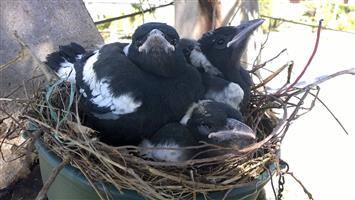The Gang-gang Cockatoo: Observations in the Wild and in Rehabilitation
December 2025
For emergency rescue support 24/7 please call 1300 094 737

The rain and winds across NSW today may have caused tree damage, brought down nests and separated young and vulnerable chicks and joeys from their parents.
Please keep an eye out for animals exposed to the elements. If the animal is nocturnal, but seen out in the daytime, there is a problem.
Parent birds have very strong instincts to protect and feed their young. Wherever possible the best outcome for most birds is to reunite them.
Often young birds will be found on the ground after falling from nests. It is normal for fledgling magpies to come to the ground as they fledge and spend a couple of days on the ground, with parents feeding them whilst they master the tricky art of flying.
However, the storms may have brought many to the ground far too early, and they may need another couple of weeks to develop to full fledgling stage before they have any chance of flying.
If the nest is too high up to get the chick back in it you can put a post in the ground, and attached a basket to it as a “pretend nest”. Or secure a basket in the tree the chick came from. Sometimes a landing perch may be needed for the parents to access the artificial "nest".
If you then move well away from the “nest”, the parents may well come back and start to feed their little one. This is always the best option as it gives the chicks the best start to be a wild bird as being raised by its parents rather than hand reared wherever possible.
It may take some time for the parents to return but if the chick is very young and there is no sign of the parents please call WIRES 1300 094 737 or report using our online 'Report a Rescue form'
Our lines and our volunteers are very busy during and after the storms so please be patient.
Please check pouches where it is safe to do so. Keep any distressed animals warm (ideally wrapped in a natural, breathable material like wool) and quiet until you can get help. Warm, dark and quiet means: around a constant 25 degrees, in a cage or box, lined and covered in a blanket or towel and away from children, television and pets. Do NOT handle and do NOT attempt to feed.
If you can't reach WIRES or are unsure of what to do, take the animal to the closest vet. They will have numbers for wildlife carers in the area and can take care of animals appropriately in the meantime. If you download our free WIRES rescue app to your phone you will be able to find your nearest vet quickly.
Stay in touch and get our regular rescue stories, WIRES updates and a free copy of our 15 Ways to Help Wildlife ebook
November 2025
November 2025
September 2025
August 2025